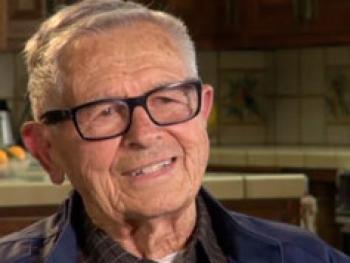Nick Danelovich

Tuna Pioneers: San Pedro-Terminal Island, California
In the early 1900's, the West Coast tuna industry was born in the small coastal California town of San Pedro, near Los Angeles. Fishing and canning businesses soon expanded to nearby Terminal Island developing into a multi-million dollar industry. At the heart of it all was a thriving immigrant community. Generations of immigrants primarily from Japan, Croatia, and Italy harvested tuna, supported the bustling fish markets, and worked in the canneries. They explored new fishing grounds and developed novel fishing and preservation methods that influenced the global tuna industry today. Though the large tuna fleet and canneries are now gone from the area, many of those who were involved still reside there. The interviews in this collection were conducted as part of an effort to create a short film about this history.
Nick was born in Hvar, Croatia, in 1914, and his family moved to Oregon when he was young. He started salmon fishing at a young age in Astoria, and then went with his brothers to fish in Alaska when he was a bit older, and that is where he first became a cook for a fishing crew. He moved to San Pedro, California, at the invitation of a friend and became the cook for many years on a tuna boats owned and operated by Captain Frank Gargas, Sr. Nick describes his schedule as a cook on the tuna boat and recounts the menu he prepared for the crew and Frank's family during a Christmas spent fishing for tuna in the waters off of New Zealand. He talks about making the crew happy by preparing special desserts for birthdays. He reflects on the big differences between San Pedro now and back when he was fishing; when it was a bustling fishing port with tuna vessels lined up at the docks and how he enjoyed the smell of tuna in the morning coming from the waterfront.
Nick Danelovich was recognized by many in the industry as one of the most respected tuna boat cooks of his era. He spent almost his entire career cooking for Captain Frank Gargas Sr. and his crew, demonstrating the loyalty and tight family-like bond that existed on the tuna boats of that era. With the crew spending so many days away from home, the cook was a reminder of home, cooking their favorite meals to help ease the loneliness they often experienced.
In the early 1900's, the West Coast tuna industry was born in the small coastal California town of San Pedro, near Los Angeles. Fishing and canning businesses soon expanded to nearby Terminal Island developing into a multi-million dollar industry. At the heart of it all was a thriving immigrant community. Generations of immigrants primarily from Japan, Croatia, and Italy harvested tuna, supported the bustling fish markets, and worked in the canneries. They explored new fishing grounds and developed novel fishing and preservation methods that influenced the global tuna industry today. Though the large tuna fleet and canneries are now gone from the area, many of those who were involved still reside there. The interviews in this collection were conducted as part of an effort to create a short film about this history. To find out more and view additional footage, visit: http://www.westcoast.fisheries.noaa.gov/fisheries/migratory_species/voices_from_the _fisheries.html
Please Note: The oral histories in this collection are protected by copyright and have been created for educational, research and personal use as described by the Fair Use Doctrine in the U.S. Copyright law. Please reach out Voices@noaa.gov to let us know how these interviews are being used in your research, project, exhibit, etc. The Voices staff can help provide other useful resources related to your inquiry.
The NOAA mission is to understand and predict changes in climate, weather, oceans, and coasts, to share that knowledge and information with others, and to conserve and manage coastal and marine ecosystems and resources. The Voices Oral History Archives offers public access to a wide range of accounts, including historical materials that are products of their particular times, and may contain offensive language or negative stereotypes.
Voices Oral History Archives does not verify the accuracy of materials submitted to us. The opinions expressed in the interviews are those of the interviewee only. The interviews here have been made available to the public only after the interviewer has confirmed that they have obtained consent.
